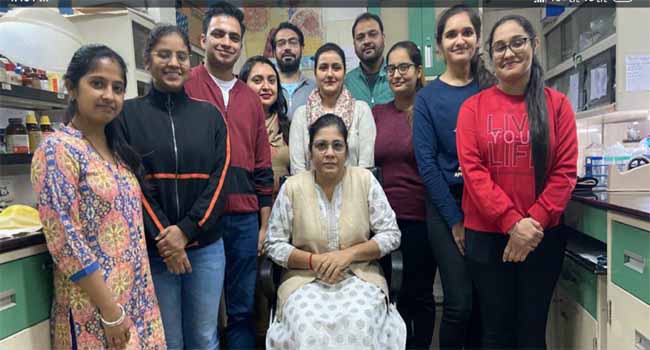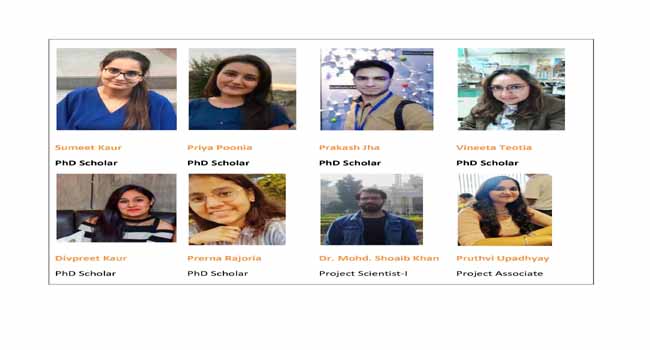Faculty

Madhu Chopra
Professor and Coordinator Bioinformatics Facility (BIF), DBTMolecular Modelling and Anticancer Drug Development
Email: mchopradu16@gmail.com, mchopra@acbr.du.ac.in
Areas of Research
- 1. Molecular Modeling, Drug Design and Bioinformatics
- 2. Drug Development and mechanism
- 3. Nanotechnology: Nanomaterials and application in drug delivery
- 1.Drug Discovery Hackathon Phase I- Award (DDH-2020), open source drug discovery Hackathon
against Covid-19, Organised by Innovation Cell, Ministry of Education.
- 2.Also selected for Phase II for doing further research in the area of drug discovery against SARS-CoV-
2-entitled, "Targeted screening of hit molecules and modulation of lead compounds for clinical
management of COVID-19: In vitro and antiviral evaluation" Rs. 23 lakhs. (July 2021)
- 1.Research Grant entitled, "Drug repurposing using computer aided design for development of
antiviral compounds against COVID19: in silico and in vitro Screening against selected antiviral
targets" Rs. 5 lakhs, 2020-21 under Faculty Research Programme of Institute of Eminence (IoE),
University of Delhi
- 2.Drug Development: From Target Identification, Validation to drug Discovery-Bioinformatics Centre
(BIC) at ACBR, Five years (w.e.f 10th Feb 2021), Rs. 1,89,36456/- (189 Lakhs approx.), Sanctioned by
Department of Biotechnology (DBT), Govt. of India
- 3.Targeted screening of hit molecules and modulation of lead compounds for clinical management of
covid 19: in vitro and antiviral evaluation, Drug Discovery Hackathon Phase II, MHRD INNOVATION
CELL, Rs. 23 lakhs, 2021-22.
- 4.Screening of novel molecules for drug repurposing for development of antiviral therapeutics
against COVID19, Institute of Excellence, FRP, University of Delhi, Rs. 3 lakhs, 2020-21.
- 5.Creation of Bioinformatics Infrastructure Facility (BIF) at ACBR, Institutional Project
Coordinator: Madhu Chopra. Since 2006- 2020, Rs. 1.04 Crore.
- 6.DU-DST Purse grant phase II, sanctioned Rs. 1.5 crore to ACBR, co-investigator with other faculty
members.
- 7.UGC-SAP project, Sanctioned Rs. 1.5 Crore to ACBR, Co-investigator with other faculty members.
- 8."Development of Anticancer Therapeutics: Targeting drug loaded nanocarriers to CD44, A
Hyaluroan Receptor'' Sanctioned by University of Delhi under DST-PURSE scheme, Rs. 12.89
Lakhs, 2009-september 2013, Madhu Chopra (PI).
- 9.Structure Based Design, Synthesis and Evaluation of Histone Deacetylase Inhibitors as Potent
Antitumour Agents, Sanctioned by DBT, Rs. 11.68 Lakhs, June 2009-2011, Madhu Chopra (PI),
Anil Mishra & Aruna Chhikara (Co-PI).
- 10.Delhi University Special Grant for Research Work, Rs. 3 lakhs per year, 2008 - 2016.
- Understanding the chromatin architecture and epigenetic factors associated with male specific
Nuclease Resistant Chromatin (NRC) in mealybugs as a correlate of genomic imprinting.- Dr. Surbhi
Kohli (ICMR, SRF)
- 01. Kant R, Kaushik R, Chopra M*, Saluja D. Structure-based drug discovery to identify SARS-CoV2 spike protein-ACE2 interaction inhibitors. J Biomol Struct Dyn. 2024 Jan 4:1-19. doi: 10.1080/07391102.2023.2300060. Epub ahead of print. PMID: 38174578. [Taylor and Francis, IF: 5.235]
- 02. Pawar A, Konwar C, Jha P, Kant R, Chopra M, Chaudhry U, Saluja D. Bactericidal activity of esculetin is associated with impaired cell wall synthesis by targeting glutamate racemase of Neisseria gonorrhoeae. Mol Divers. 2023 Oct 25. doi: 10.1007/s11030-023-10745-0. Epub ahead of print. PMID: 37880544. [Springer, IF 3.8]
- 03. Khan MJ, Singh P, Jha P, Nayek A, Malik MZ, Bagler G, Kumar B, Ponnusamy K, Ali S, Chopra M, Dohare R, Singh IK, Syed MA. Investigating the link between miR-34a-5p and TLR6 signaling in sepsis-induced ARDS. 3 Biotech. 2023 Aug;13(8):282. doi: 10.1007/s13205-023-03700-1. Epub 2023 Jul 24. PMID: 37496978; PMCID: PMC10366072. [Springer, IF: 2.8]
- 04. Singh P, Mohsin M, Sultan A, Jha P, Khan MM, Syed MA, Chopra M, Serajuddin M, Rahmani AH, Almatroodi SA, Alrumaihi F, Dohare R. Combined Multiomics and In Silico Approach Uncovers PRKAR1A as a Putative Therapeutic Target in Multi-Organ Dysfunction Syndrome. ACS Omega. 2023 ;8(10):9555-9568. doi: 10.1021/acsomega.3c00020. PMID: 36936296; PMCID: PMC10018728. [ACS, IF: 4.1]
- 05. Poonia, P., Sharma, M., Jha, P., Chopra, M.* (2023) Pharmacophore-based virtual screening of ZINC database, molecular modeling and designing new derivatives as potential HDAC6 inhibitors. Mol Divers. 2023;27(5):2053-2071. doi: 10.1007/s11030-022-10540-3. Epub 2022 Oct 10. [Springer, IF 3.8]
- 06. Jha, P., Saluja, D., Chopra, M.* (2022) Structure-guided pharmacophore based virtual screening, docking, and molecular dynamics to discover repurposed drugs as novel inhibitors against endoribonuclease Nsp15 of SARS-CoV-2, Received 14 Nov 2021, Accepted 14 May 2022, Published online: 02 Jun 2022.https://doi.org/10.1080/07391102.2022.2079561
- 07. Jha,P., Singh, P., Arora, S., Sultan, A., Nayek, A., Ponnusamy, K., Syed, M.A., Dohare, R., Chopra, M. (2022)Integrative multi-omics and in silico analysis reveals the role of ARHGEF1 and its screened antagonist in mild and severe COVID-19 patients, J Cell Biochem Jan 17. doi: 10.1002/jcb.30213. [Wiley, IF 4.429]
- 08. Pawar, A., Jha, P., Chopra, M., Chaudhry, U., Saluja, D. (2020) Screening of natural compounds that targets glutamate racemase of Mycobacterium tuberculosis reveals the anti-tubercular potential of flavonoids, Scientific Reports, 10, Article no. 949, Doi: 10.1038/s41598-020-57658-8. [Nature, IF 4.011]
- 09. Sharma, M., Jha, P., Verma, P., Chopra, M*. (2019). Combined comparative molecular field analysis, comparative molecular similarity indices analysis, molecular docking and molecular dynamics studies of histone deacetylase 6 inhibitors, Chemical Biology and Drug Design, 93(5): 910-925. https://doi.org/10.1111/cbdd.13488. [Wiley, IF 2.548].
- 10. Pawar A, Jha P, Konwar C, Chaudhry U, Chopra M, Saluja D. (2019). Ethambutol targets the glutamate racemase of Mycobacterium tuberculosis-an enzyme involved in peptidoglycan biosynthesis. Appl Microbiol Biotechnol. 103(2):843-851. doi: 10.1007/s00253-018-9518-z. [Springer, IF- 3.913]
- 11. Sinha, R., Singh, P., Saini, N. K., Kumar, A., Pathak, R., Chandolia, A., Chopra, M. Bose, M. (2018). Methyl-accepting chemotaxis like Rv3499c (Mce4A) protein in Mycobacterium tuberculosis H37Rv mediates cholesterol-dependent survival. Tuberculosis, 109, 52-60. https://doi.org/10.1016/j.tube.2018.01.004. [Elsevier, IF- 2.576]
- 12. Wasim, L., & Chopra, M.* (2018). Synergistic anticancer effect of panobinostat and topoisomerase inhibitors through ROS generation and intrinsic apoptotic pathway induction in cervical cancer cells. Cellular Oncology,41(2), 201-212 . https://doi.org/10.1007/s13402-017-0366-0. [Springer, IF-5.304].
- 13. Kumar, P., Wasim, L., Chopra, M.*, & Chhikara, A. (2018). Co-delivery of Vorinostat and Etoposide Via Disulfide Cross-Linked Biodegradable Polymeric Nanogels: Synthesis, Characterization, Biodegradation, and Anticancer Activity. AAPS PharmSciTech, 19(2), 634-647. https://doi.org/10.1208/s12249-017-0863-5. [AAPS, IF- 2.703
My group is doing active research in Computer Assisted Drug Design and Development. Using various computational methods such as pharmacophore modelling, 3D QSAR, virtual screening etc. We have identified several lead compounds against important cancer targets. Along with computational design my group is working towards development of anticancer compounds considering GPCR, HDAC and COX- 2 as molecular Targets. Recently our group designed lead compounds against SARS-CoV-2 targets and is recipient of Drug Discovery Hackathon Phase I- Award (DDH-2020), Open-source drug discovery Hackathon against Covid-19, Organized by Innovation Cell, Ministry of Education. Our group was selected and funded for phase two of the DDH- project to further our research in the area of drug discovery against COVID-19 disease.
The projects involve detailed mechanistic studies, protein-protein interaction networks (PPIs) of cancer targets in order to find effective combination therapy regimes against various cancer types. In addition, our group is also pursuing synthesis of medicinally important compounds. The group is also involved in isolating natural compounds having anticancer properties using cell based in vitro and in vivo screening methods. Nanoparticle based drug delivery agents is another area where the group is working to give target specific pharmaceutical agents.
I am also serving as Coordinator of the BIC facility funded by the Department of Biotechnology since 2006. In the year 2020, the support was further extended for a period of five year with Drug development as the major objective of the BIC Centre.
Ph.D. Guidance: 11 Completed; 05 under progress
M.Sc. Projects Guided: 55
Summer Training Projects: 40
Our future plans include....
• To continue with research projects involving modelling of GPCR, HDAC, cMET: Pharmacophore modelling, 3D QSAR, docking and virtual screening for development of novel lead molecules.
• Virtual screening of plant derived molecules, building databases for virtual screening for drug-like compounds.
• Development of nanoparticle-based drug delivery agents
• Initiate collaborative programmes with other institutions for enriching biodiversity information resources and promoting human resource development in drug discovery and bioinformatics.
Awards:
Ongoing Projects:
Mentoring following Projects:
Selected Recent Publications:

